Best Webflow Alternatives 2025: 14 Website Builders Reviewed
Thanks to website builders like Webflow, you can now create websites without knowing CSS or HTML. Webflow and other no-code platforms offer attractive templates, visual editors, and design tools that make web design accessible to everyone.
Webflow is just one of the many available options, and despite the positives, it takes longer to get familiar with than other website builders. If you'd like to see what else is out there, here are some of the best Webflow alternatives.
Why Not Webflow?
Don't get us wrong: Webflow is one of the best website builders on the market. In our website builder comparison, it finished third, right behind Wix and Squarespace. Still, it might not be the best option for every project or user.
To start, Webflow isn't your typical website builder. This hybrid platform, which is equal parts website builder and CMS, visualizes coding logic instead of hiding it completely like Wix and similar tools do.
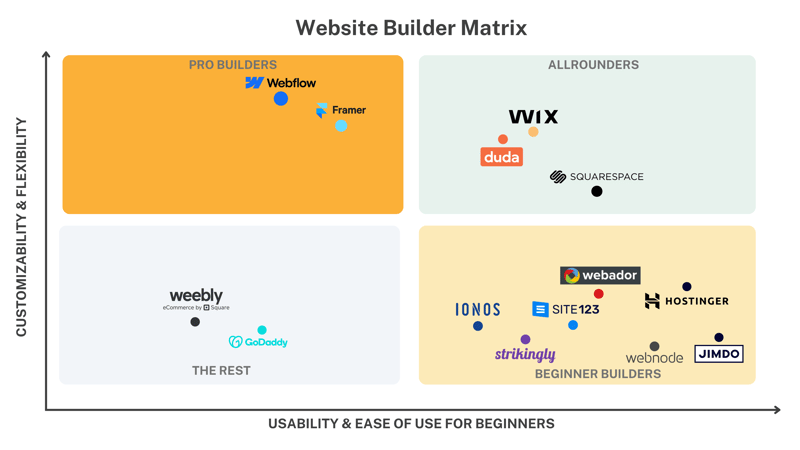
In our website builder guide, we put Webflow in the "pro builder" category, which appeals more to advanced users.
While Webflow lets you edit your website with drag-and-drop and pre-made content blocks, you still need to understand and use basic web design concepts like the box model. There are more design options in Webflow, but its complex interface makes it more challenging for beginners to use.
These are Webflow's main drawbacks:
Relatively complex
While Webflow's no-code approach makes it interesting for beginners, those unfamiliar with web design logic might get quickly overwhelmed. Its visual editor relies more on complex design and coding principles than typical website builders.Still just a website builder
Even though Webflow is more versatile than other website builders, it's still just a builder. Since it's a closed system, Webflow isn't as flexible as an open-source CMS like WordPress.Limited ecommerce features
Webflow also isn't the best option for ambitious ecommerce projects. It lacks basic features (like customer accounts and support for multiple currencies) and seems to have stopped developing its shop platform.Pricey
Webflow costs more than most other website builders we reviewed.
Are you having second thoughts about using Webflow for your project? If so, don't worry; there are plenty of alternatives, and almost all cater to beginners with no coding skills.
The 5 Best Alternatives to Webflow
Choosing the best Webflow alternative depends on what you don't like about the platform or which features you're missing. Here are five alternatives that outperform Webflow in different areas:
Easier to Use Than Webflow: Wix

Wix ranked first in our review because it offers a great all-around package: Its editor strikes a good balance between design flexibility and ease of use, you get plenty of features, and Wix's app market offers countless add-ons.
Wix also serves up great marketing tools and provides a solid sales platform thanks to its well-developed ecommerce features.
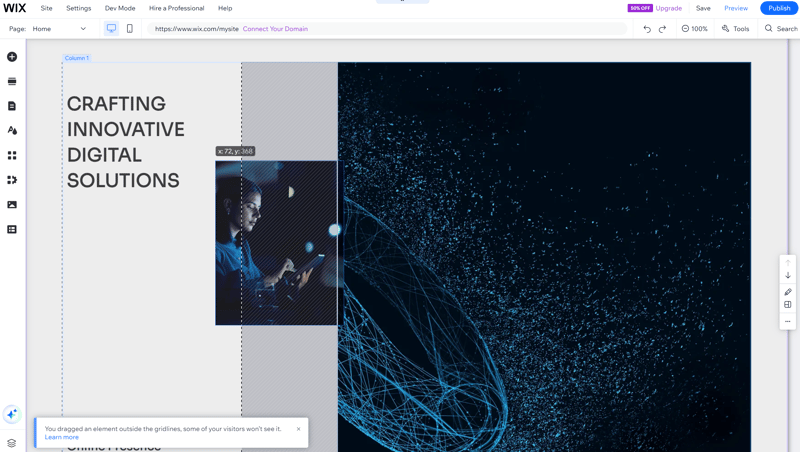
Wix's editor is more beginner-friendly than Webflow's.
There also isn't as much of a learning curve because of Wix's beginner-friendly no-code interface. While there aren't as many customization options as in Webflow - which lets you do pretty much anything you can code in its visual editor - it's much easier to use.
For less experienced website creators and anyone who wants to avoid coding altogether when designing their website, Wix is clearly the better choice.
intuitive drag-and-drop interface
many features + app marketplace
800+ design templates
numerous elements and section templates
fewer customization options compared to Webflow
editor can be slow and sluggish
relatively expensive
Better Templates Than Webflow: Squarespace

When you think of Squarespace, you probably imagine its iconic templates. These days, the New York-based website builder's design templates are still among the most beautiful on the market – and we like them even better than Webflow's.
But there's more to Squarespace than just good designs. For a website builder, it offers solid customization options, is easy to use, and provides a wide range of features, including blogging and ecommerce tools.
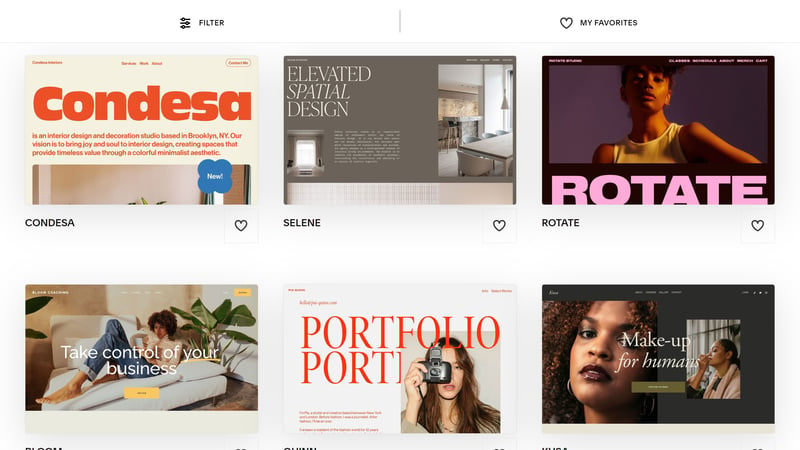
Squarespace is best known for its high-quality templates.
Like Webflow, Squarespace limits what you can do. If you value high-quality design templates and don't mind working within its editor's capabilities, Squarespace is a great choice.
150+ attractive, high-quality templates
easy to use
powerful ecommerce features
wide selection of section templates
relatively expensive
no CMS like Webflow
disappointing support
More Focus on Web Design Than Webflow: Framer

If Webflow is a website builder with powerful design features, Framer is the opposite: a design platform that comes with website builder tools.
Framer is all about design. Like Figma, you can use it to draft websites and prototypes on a blank canvas without any preset layouts or fixed structures. Once you're satisfied, you can bring your content to life with impressive effects and animations.
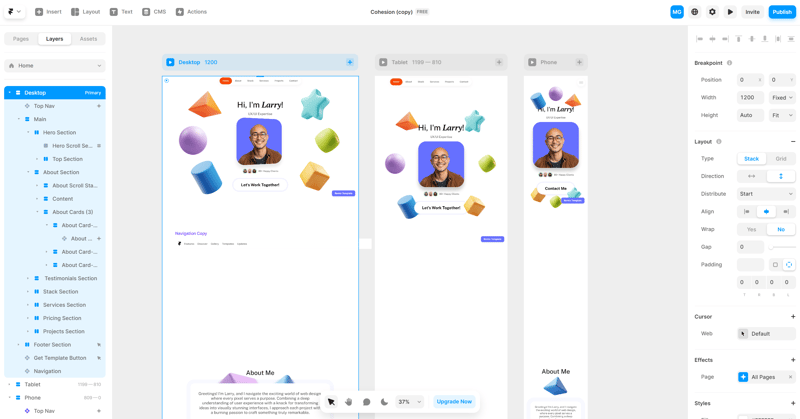
Framer is a website builder for web designers.
When it comes to designing a website, Framer is even better than Webflow. However, in terms of actual website building, Framer isn't as comprehensive. It lacks some common website builder features and functions, like an ecommerce platform. Also, there's no real customer support.
extensive design features
impressive user-created templates
comprehensive team management
includes CMS
steep learning curve
no ecommerce features
no direct support
Better for Ecommerce Than Webflow: Shopify

If your goal is to build an online store, you might want to go with a dedicated ecommerce platform like Shopify. While Webflow offers shop features, they're intended for smaller stores with more basic needs.
Shopify focuses entirely on ecommerce: Its features are far more advanced and can handle large, complex stores with extensive inventory and or customization needs.
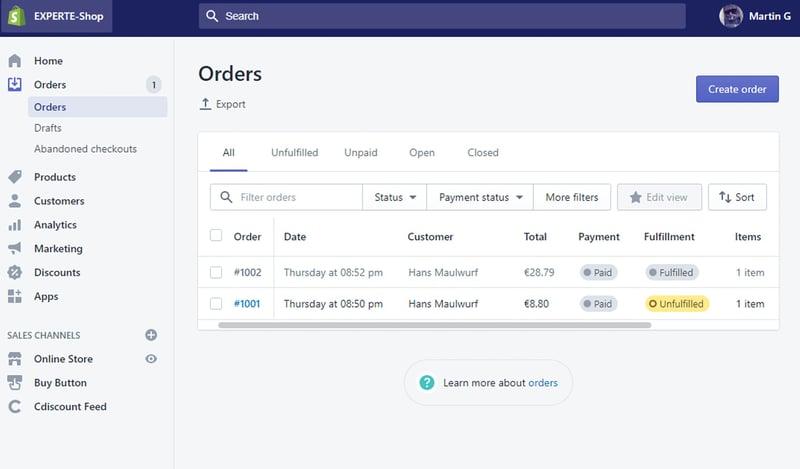
A shop system like Shopify is perfect for big ecommerce projects.
Shopify combines extensive ecommerce features with the benefits of a website builder: You can build your shop using templates and visual design tools and manage everything from a user-friendly dashboard.
However, Shopify can't match Webflow's flexibility and design freedom.
better ecommerce features than Webflow
user-friendly, easy-to-navigate dashboard
simple website builder for customizing your store
transaction fees when using external payment gateways
less flexible as a website builder compared to Webflow
slow customer support
CMS Alternative to Webflow: WordPress
Since Webflow is both a website builder and CMS, we need to compare it to the king of CMS - WordPress. Spoiler alert: No website builder can win this comparison - not even a professional platform like Webflow.
WordPress is free and open-source. There are seemingly endless numbers of plugins and add-ons - far more than Webflow offers. Plus, with drag-and-drop builders like Elementor, you can turn WordPress into a full-featured website builder.
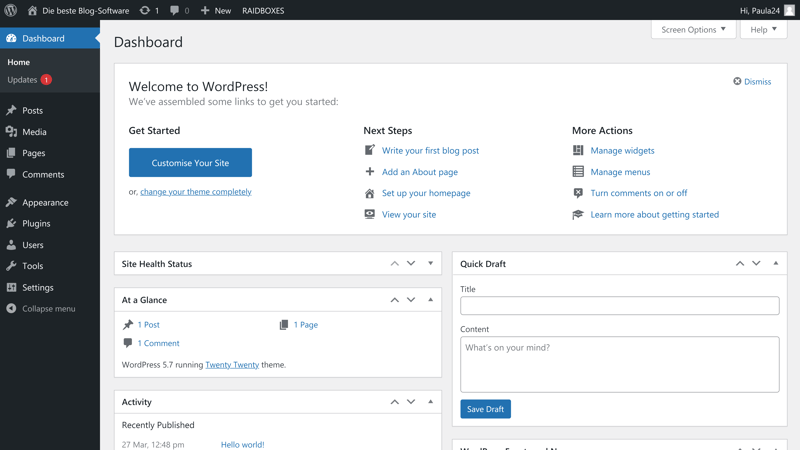
WordPress is the most popular CMS worldwide.
However, unlike Webflow, which includes everything in one package, you'll need to handle hosting and security yourself with WordPress. There are special WordPress hosting services that make these tasks easier, but they must be purchased. Finally, WordPress doesn't offer direct customer support.
free and open-source
more control over your website's technology and design
lots of plugins and add-ons
more hands-on, especially for hosting and security
no direct customer support
Other Alternatives
In our website builder comparison, we thoroughly tested 14 platforms and rated them across five categories: ease of use, templates & design, advanced features, support, and pricing. Webflow ranked 3rd, but you can find the complete ranking of all 14 providers here:
Conclusion
In the world of website builders, Webflow is in a league of its own. The builder-CMS hybrid allows users to utilize complex coding logic in a no-code editor. It's a great tool for experienced website creators who value flexibility and versatility over beginner-friendly features.
For those who find Webflow too complicated or don't like it for other reasons, there are plenty of options available. Our winner, Wix is a more user-friendly all-rounder, Squarespace stands out with better design templates, and Shopify offers stronger ecommerce features.
Looking for a website-building platform that caters even more to web designers? Check out Framer. If none of the above offer enough flexibility and you want maximum control over your online projects, an open-source CMS like WordPress is likely your best choice.
Picking the right platform depends on many factors. Our detailed reviews of 14 website builders and 8 ecommerce systems can get you started in the right direction.






























